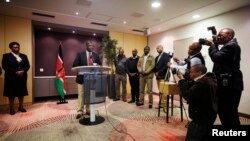THE HAGUE, NETHERLANDS —
Deputy Kenyan President William Ruto said on Tuesday he would continue to cooperate with the International Criminal Court despite a call from African leaders for the prosecution of President Uhuru Kenyatta to be halted.
Ruto told a news conference in The Hague that he would prefer for the case to proceed but that he should be excused from appearing in person so that he could carry on with his duties in Kenya.
Ruto and Kenyatta face charges of crimes against humanity over accusations they orchestrated widespread violence after a disputed 2007 election. Both men deny the charges and have tried to have the prosecutions adjourned or halted.
An African Union summit in Addis Ababa at the weekend strongly criticized the workings of the court, complaining that it had only pursued Africans. The court has convicted just one man, a Congolese warlord.
The summit said the U.N. Security Council should defer Kenyatta's trial under article 16 of the court's Rome Statute, which allows for an initial delay of a year, or the AU would seek an alternative means of postponement.
Kenyatta's trial is the court's most high profile case so far-the first against a sitting president.
“We are going to pursue United Nation Security Council adjudication on this matter so this case can be deferred, but more preferably we would want to work with the court's decision to grant us excusal from continuous attendance so that both issues can be balanced out,” Ruto told journalists.
Ruto told a news conference in The Hague that he would prefer for the case to proceed but that he should be excused from appearing in person so that he could carry on with his duties in Kenya.
Ruto and Kenyatta face charges of crimes against humanity over accusations they orchestrated widespread violence after a disputed 2007 election. Both men deny the charges and have tried to have the prosecutions adjourned or halted.
An African Union summit in Addis Ababa at the weekend strongly criticized the workings of the court, complaining that it had only pursued Africans. The court has convicted just one man, a Congolese warlord.
The summit said the U.N. Security Council should defer Kenyatta's trial under article 16 of the court's Rome Statute, which allows for an initial delay of a year, or the AU would seek an alternative means of postponement.
Kenyatta's trial is the court's most high profile case so far-the first against a sitting president.
“We are going to pursue United Nation Security Council adjudication on this matter so this case can be deferred, but more preferably we would want to work with the court's decision to grant us excusal from continuous attendance so that both issues can be balanced out,” Ruto told journalists.





